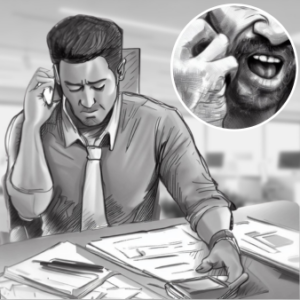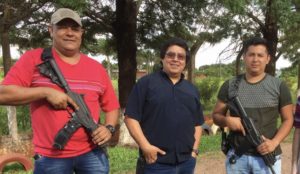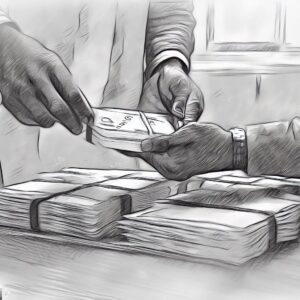*To protect the safety of journalists mentioned in this article, the identities of some have not been disclosed at their express request, due to their vulnerable and at-risk situation.
"What is your biggest fear doing journalism on the border between Paraguay and Brazil?," we asked our first interviewee. He answered: "Writing and saying too much, without sizing up its dimensions for the region’s codes. That can put my life at risk," the multimedia journalist told LJR. They answered from the city of Ponta Porã, in the state of Mato Grosso do Sul, Brazil, where they have worked for 25 years.
The border between Paraguay and Brazil is one of the most dangerous drug trafficking regions in South America. It is ruled by the Primeiro Comando da Capital [First Capital Command or PCC, by its Portuguese acronym), the Brazilian criminal group that controls trafficking of both marijuana and cocaine.
Threats to the practice of journalism are commonplace in Ponta Porã and Pedro Juan Caballero. There is an unspoken daily alert that forces communication professionals to censor themselves. That is: in the news they avoid using names or information that could compromise them.
"Life here is not worth anything," added the journalist, who prefers to keep their identity confidential.
Stories of threats are always present in the lives of journalists in this border region. In 2016, when drug boss Jorge Rafaat was murdered, the article published on the news site coordinated by this journalist had to be withdrawn at the express request of criminal gangs.
"We had published the news about the perpetrator of that murder, of his links to money laundering and weapons acquisition. They immediately called me to take it offline," the journalist said. And as a consequence of another story, "they rang the doorbell of my house asking for the same thing in relation to a news item about Brazilian drug trafficker (Jarvis) Pavão."

A journalist received threats via telephone after publishing an article about the murder of drug kingpin Jorge Rafaat in 2016. (Illustration: AI-generated)
A street of dark green vegetation divides Ponta Porã, Brazil from Pedro Juan Caballero, Paraguay. They are twin cities. The countries’ flag fly on either side of this binational line. The Brazilian state of Mato Grosso do Sul has 272 miles of so-called dry border (by land) with Paraguay.
Practicing journalism in this region has cost lives and threats since the 1990s. International organizations have reported and investigated from outside the region.
It “was the case of Brazilian journalist Léo Veras in February 2020 and Paraguayan journalist Humberto Andrés Coronel Godoy in September 2022,” said a summary from Reporters Without Border (RSF, for its acronym in French). “Both were murdered in Pedro Juan Caballero, a city on the Brazilian border that is a regional drug trafficking hub. Reporters are often the targets of violence during protests. Most attacks on journalists go unpunished.”
Fear seeps into their coverage and in the newsroom. There have already been at least 10 journalist deaths on that border in the last decade.
Especially on the Paraguayan side, where 21 journalists have been murdered in 30 years. This country is ranked No. 103 out of 180 countries classified by RSF, due to the risk of practicing the profession. The list begins with a ranking from best to worst in terms of press freedom. Brazil ranks No. 92 and both countries are characterized as "problematic."
In 2020, the case of the cold-blooded murder of Leo Veras, a journalist who covered police and drug trafficking issues, shocked the local press and affected the work of journalists in the region. The Brazilian Association of Investigative Journalism (Abraji), which is following the case, spoke to LJR.
"There is a constant feeling of impunity. To this day there is no news about those responsible for the murder of (Leo) Veras. In 2022, the Paraguayan justice system acquitted Waldemar Pereira Rivas, alias Cachorrão, leader of the PCC, one of those suspected of having participated in the crime," Angelina Nunes, coordinator of Abraji's Tim Lopes Program, told LJR. "Journalists on that border are on a razor's edge," she said.
However, some time later, in March 2023, the Paraguayan Judiciary overturned the acquittal and ordered a new trial.
TV, radio and online media report the facts, but without getting into investigative details so as not to involve names of drug traffickers, politicians and smugglers.
"What happens on the border can also be seen in the deepest parts of Brazil. When a journalist dies or disappears, the local community withdraws out of fear. And then, the shape of journalistic coverage is modified and a series of important issues are no longer followed," said [Angelina] Nunes, who was on the border between Pedro Juan Caballero and Ponta Porã when Veras was killed.
Practicing freedom of expression in that territory becomes an exercise in self-censorship. Marciano Candia, correspondent of Acción Multimedios, told LJR: "Oftentimes, you have to frame the news not as you’d like to and be very careful when carrying-out in-depth investigations." In 2022, Candia reported on threats prior to the murder of radio journalist Humberto A. Coronel Godoy for the online newspaper Última Hora.
The working conditions of journalists in the region increase their exposure to danger and fear is part of everyday life.
"Many of them work at home, where they live with their families and from there they write, set up their radio studios and broadcast shows online," Sergio Ramalho told LJR. He is an investigative journalist who collaborates with Abraji’s Tim Lopes Program for the protection of journalists.
Although there are networks of institutions and support networks for journalists at risk, what can be done beyond removing the journalist from the city where he/she is in danger? Does this action alone solve the situation? What is the responsibility of authorities in both countries?
"The main and most important thing to make clear is that in no case should journalists be silent. In all circumstances, they should ask for help," said journalist and researcher Nunes.
"Either you work under 24-hour police protection or you have to move elsewhere," a TV journalist from the border region who preferred to withhold their name and identity told LJR.

Journalist Cándido Figueredo (center) lived with armed guards around the clock back in Paraguay. (Courtesy)
Leaving the country was the safest decision for Paraguayan reporter Cándido Figueredo, winner of the 2015 International Press Freedom Award from the Committee to Protect Journalists (CPJ). In 2020, after spending 24 years and 8 months under police protection and working for the newspaper ABC Color, Figueredo moved from Pedro Juan Caballero to the United States, where he is currently in the process of applying for asylum.
"What prompted my departure from Paraguay was the murder of Leo Veras. The day after his death, the Brazilian Federal Police informed me they had intercepted a phone call and that the next victim would be me," he told LJR from Philadelphia, where he lives and works teaching Spanish at Thomas Jefferson University.
Figueredo lived on the border in the 1990s and 2000s. Those were times of growing drug production and distribution in the region. Fear took hold of the inhabitants and curtailed freedom of expression. On the border between Paraguay and Brazil, drug trafficking became strong not only in Ponta Porã and Pedro Juan Caballero, but also in Ciudad del Este, Foz do Iguazú and Saltos del Guairá.
"The mafias took control based on terror, assassinations and weapons from the PCC [from São Paulo] and the Comando Vermelho [Red command, from Rio de Janeiro]. Fear made people not want to mess with them and many bowed to the mafias for benefits, such as Paraguayan politicians," Figueredo said.
One of the most striking incidents involved Figueredo and a lawyer for a criminal group who wanted to bribe him not to write or publish articles that would compromise them.
"The lawyer came to see me. I followed the conversation and asked him how much he would pay me for not publishing. 'Three thousand dollars,' he replied. I got a voice recording of the conversation with a tape recorder I had in my pocket and a written text the lawyer had drafted for eventual publication according to his criteria and that he intended for me to publish," Figueredo detailed. Once the lawyer left, Figueredo wrote an article about the bribery incident. And he donated the three thousand dollars to a children's hospital so they could buy fans. The bribery story was published in ABC Color and came to the attention of the local mafia. The message he received was clear: "As soon as I can, I'll kill you."
The protective measures Figueredo took when he lived in Paraguay was a strategy of minimal public exposure.

Figueredo said that a lawyer for a criminal group bribed him not to publish articles that would compromise their clients. The journalist donated the money to a hospital and wrote about the incident. (Illustration: Generated using AI)
"I never went to bars, restaurants, weddings, or parties. Besides, I had an agreement with my closest circle. My relatives said I was crazy and that they had not been in contact with me for a long time. For my part, I said I had no contact with them either. It was a family agreement to get my relatives out of sight and and out of danger from drug traffickers," he said.
According to police statistics sources, the border cities of Pedro Juan Caballero and Ponta Porã have an average of 150 murders per year having to do with organized crime. The city of Ponta Porã concentrates 10.6% of all registered homicides in the state of Mato Grosso do Sul. Where the State is absent, these sectors take over territory and power.
"If institutions functioned, we’d have greater security, but that does not happen and that’s why the perpetrators of murders of fellow journalists have not yet been arrested," Figueredo said.